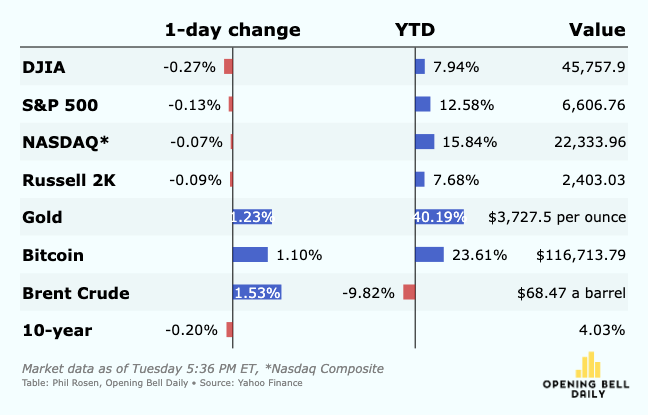Good morning, investors. I’ve found myself at the New York Stock Exchange more and more lately, and during Tuesday’s closing bell I spoke with them about what I’m watching for today’s Fed decision. You can watch the full episode here.
This morning’s edition unpacks the central bank’s entry into the age of AI.
Reasons for cutting
The Federal Reserve’s first interest rate cut in a year doesn’t fit neatly into the usual motives for monetary policy.
Broadly, the central bank eases for one of two reasons:
Rescue an economy from recession risks
Catalyze a new expansion
While policymakers will point to weakness in the labor market as the primary reason for September’s move, there is a third motive at play.
The Fed must transition from a restrictive regime into one shaped by AI’s deflationary force and tariffs that have proven less inflationary than expected.

Markets see guaranteed odds for a 25 basis point cut in September (Chart courtesy of Exhibit A)
The cut will indeed alleviate labor-market pressure and buoy asset prices, but more importantly it marks the initial policy adjustment in a new economic age where technology is working to bend the inflation curve lower.
That, in theory, should give policymakers more room to ease than past cycles.
So rather than chasing easy money or “firefighting,” to borrow former Fed Chair Ben Bernanke’s language, the central bank must manage the transition into a world shaped by technology, debt and liquidity.
Even though job growth remains soft, the economy and its consumers have held up.
The Fed’s own economists still project third-quarter GDP to hit 3.4% — hardly a recessionary signal.

At the same time, long-term inflation expectations— a key part of the Fed’s dual mandate — will continue to shift as AI makes companies more productive with fewer costs and employees.
It’s no wonder that the number of S&P 500 companies citing “inflation” during earnings just fell to a five-year low, while those mentioning “AI” hit the highest in a decade, according to FactSet.

The structural backdrop, meanwhile, is even more important than any near-term fluctuations to interest rates.
“We are moving further into the fiscal dominance regime that started in 2020,” Darius Dale, chief executive of 42Macro, told me on the sidelines at the Independent Investor Summit.
“That ultimately means we have to price in a lower term structure of interest rates, we have to price in a much larger Fed balance sheet over a long-term time horizon, and ultimately a lot more global liquidity.”
Earn Your Certificate in Real Estate Investing from Wharton Online
The Wharton Online + Wall Street Prep Real Estate Investing & Analysis Certificate Program is an immersive 8-week experience that gives you the same training used inside the world’s leading real estate investment firms.
Analyze, underwrite, and evaluate real estate deals through real case studies
Learn directly from industry leaders at firms like Blackstone, KKR, Ares, and more
Earn a certificate from a top business school and join a 5,000+ graduate network
Use code SAVE300 at checkout to save $300 on tuition $200 with early enrollment by January 12.
Program starts February 9.
Market snapshot

Elsewhere
📊 US retail sales rose more than expected in August. The figure climbed 0.6% against forecasts for 0.2%, pushing back on calls for an economic slowdown. July’s results were also revised higher to 0.6%, from 0.5%. (Barron’s)
💰 Microsoft is planning billions in investment for AI in the UK. The company said it will deploy $30 billion between 2025 and 2028 there. Nvidia, Google, and OpenAI also ramped up their commitments to the UK as President Trump visits this week. (CNBC)
Rapid-fire
The last 10 trading days of September are the weakest of the year (Barron’s)
Oracle, Silver Lake, and Andreessen Horowitz are part of a consortium that will control an 80% stake in a TikTok deal (WSJ)
Mortgage rates dropped to a three-year low ahead of the Fed’s cut (CNBC)
Bitcoin tends to trail gold’s performance on a 100-day lag (Pomp Letter)
The BLS chief that President Trump fired said her removal was a “dangerous step” (WSJ)
Google’s Gemini topped the Apple app store, surpassing ChatGPT (CNBC)
Elon Musk bought $1 billion in Tesla stock at the end of an 80% rally (Opening Bell Daily)
New York Stock Exchange segment
I joined our friends at NYSE for a separate conversation on the Fed, the historic negative jobs revision, and how policymakers have waived the white flag on inflation.
Last thing
About me
📰 I’m Phil Rosen, co-founder and editor-in-chief of Opening Bell Daily. I’ve published books, lived on three continents, and won awards for my journalism, which has appeared in Business Insider, Fortune, Yahoo Finance, Bloomberg and Inc. Magazine.
I write our flagship newsletter to prepare you for each trading day — unpacking markets, economic data and Wall Street with analysis you won’t find anywhere else.
Feedback? Reply to this email, ping me on X @philrosenn, or write me directly at [email protected].




